

An interview with Dr. Lotsee Patterson, a founding member of AILA – American Indian Library Association. By Zora Sampson In order to honor the 35th anniversary of the American Indian Library Association, our AILA, it was my privilege to interview one of the founders, Dr.
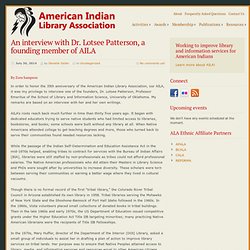
Lotsee Patterson, Professor Emeritus of the School of Library and Information Science, University of Oklahoma. My remarks are based on an interview with her and her own writings. AILA’s roots reach back much further in time than thirty five years ago. It began with dedicated educators trying to serve native students who had limited access to libraries, bookstores, and books; some schools were built without any library at all. While the passage of the Indian Self-Determination and Education Assistance Act in the mid-1970s helped, enabling tribes to contract for services with the Bureau of Indian Affairs (BIA), libraries were still staffed by non-professionals as tribes could not afford professional salaries.
Top Ten Things You Need to Know About Tribal Libraries. 1.
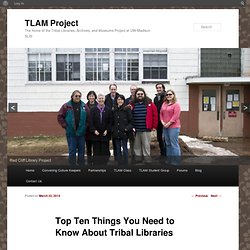
Without Lotsee Patterson and her infinite amounts of moxie, tribal libraries would be a far cry from where they are today. Patterson has been actively campaigning and working towards library services for tribal communities since the late 1950s. Lotsee Patterson 2. Janice Rice, this week’s guest speaker and one of this year’s TLAM instructors also clued us in to some other names we should be aware of when thinking about work in tribal libraries. A group of AILA members from 2012 3. 4. 5. The TRAILS manual has undergone 3 revisions and can be found online 6. This photo was taken November 2013 by Della Nohl at the Convening Culture Keepers hosted by the Ho Chunk Nation in Baraboo, WI 7. 8. The James E. 9. 10. Other related readings: Biggs, B. (2000). Culturally responsive guidelines for Alaska public libraries.
Movers & Shakers 2014 — Change Agents. Home - Indigenous Librarianship - Research Guides Home at University of British Columbia. World Libraries: The International Indigenous Librarians' Forum: A Professional Life-Affirming Event. The International Indigenous Librarians' Forum: A Professional Life-Affirming Event Loriene Roy For two years, from 1997-1999, members of Te Ropu Whakahau ("they, who encourage and incite"), the Maori Library and Information Workers' Association, were engaged in intensive planning for the first International Indigenous Librarians' Forum.
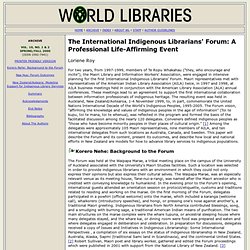
Maori representatives met with representatives of the American Indian Library Association (AILA) twice, in 1997 and 1998, at AILA business meetings held in conjunction with the American Library Association (ALA) annual conferences. These meetings lead to an agreement to support the first international collaboration between information professionals of indigenous heritage. v29.07.pdf. Indigenous Librarianship: A Global Perspective.
Acknowledgments As one who had the privilege of knowing and working with Jean Coleman, it is a distinct pleasure to be asked to present lecture which honors her.
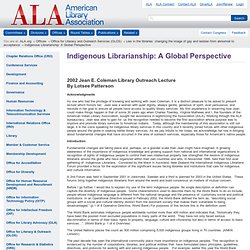
Jean was a woman with quiet dignity, always gentle, generous of spirit, ever persuasive, and resolute in her goal to ensure all people have access to quality library services. My first experience in observing how Jean could make things happen is that of some 30 years ago when Charles Townley, Virginia Mathews and I, the founders of the American Indian Library Association, sought her assistance in legitimizing the Association (AILA). Working through the ALA bureaucracy, Jean was able to gain for us the recognition needed to become the first association whose purpose was to improve and promote library services to American Indians. Introduction Fundamental changes are taking place and, perhaps, on a grander scale than Jean might have imagined.
Before I go further, I would like to explain my use of the term indigenous people. Issues. International Indigenous Librarians Forum - American Indian Library Association. The Eighth International Indigenous Librarians’ Forum was held May 10, 2013-May 13, 2013 in Bellingham, WA.
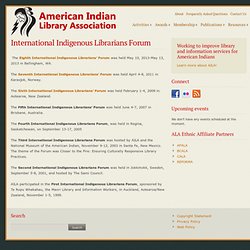
Māku anō e hanga tōku nei whare = Determining our future : sixth International Indigenous Librarians' Forum 2009 : held at Te Wānanga-o-Raukawa, Ōtaki, Aotearoa/New Zealand, 1 - 4 February 2009. The Tribal Libraries, Archives, and Museums (TLAM) Project. Editor’s note: This is a guest post from Robin Amado and Jake Ineichen.
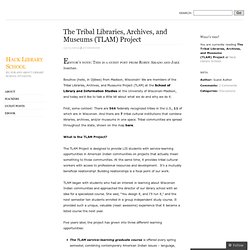
What makes a good conference? Or: Why we loved ATALM in New Mexico. As we begin planning for our own gatherings – our seventh Convening Culture Keepers at Ho-Chunk Nation, and our IMLS-sponsored Convening Great Lakes Culture Keepers institute at Ziibiwing – we’ve been spending lots of time reflecting on our own conference-going experiences.
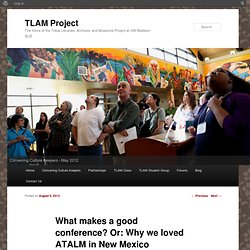
The view of the resort from our room. Bill creates national commission to study Native youth issues. WIld Foods Project. Neq'rkat - The Alutiiq Wild Foods Project A scatter of broken clamshells hints than an octopus is hiding under a nearby rock.
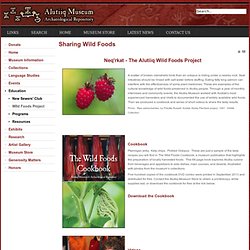
Seal intestines should be rinsed with salt water before stuffing. Eating fatty king salmon can interfere with the effectiveness of some plant medicines. These are examples of the cultural knowledge of wild foods preserved in Alutiiq people. Through a year of monthly interviews and community events, the Alutiiq Museum worked with Kodiak's most experienced harvesters and chefs to documented the use of widely available wild foods. Southeast Alaska's Online Newspaper. I Love You America But This List Should NOT Make You Uncomfortable.
I Love You America But This List Should NOT Make You Uncomfortable. Chipping Away at It. By Leanne Jenkins Planning Director, Jamestown S’Klallam Tribe Fifteen years ago, we at the the Jamestown S’Klallam Tribal Library had no functional way to keep track of our collections, no good way to share the many objects and photographs that tell the story of this community’s history, culture, and traditions.
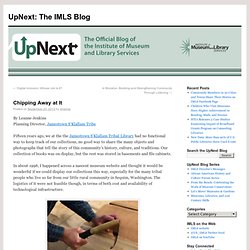
Our collection of books was on display, but the rest was stored in basements and file cabinets.